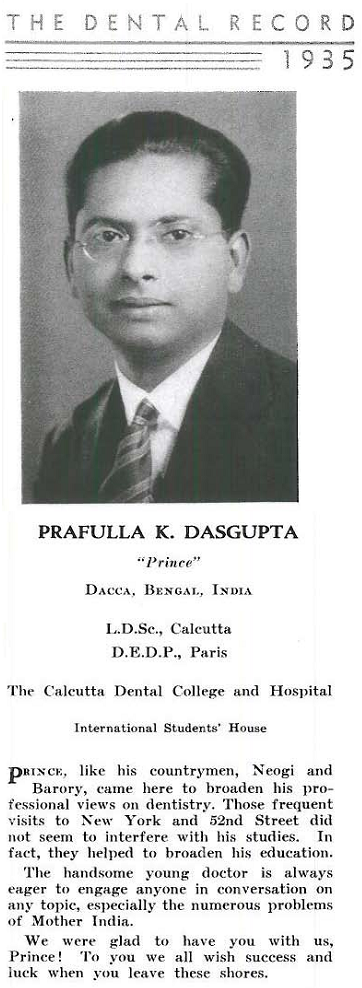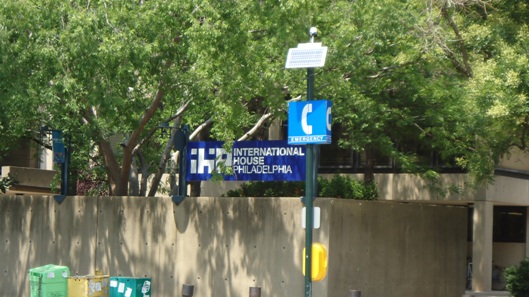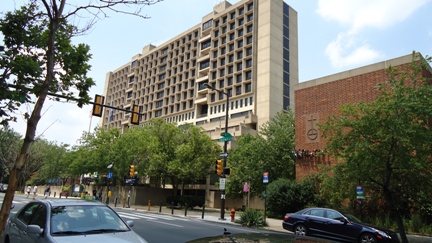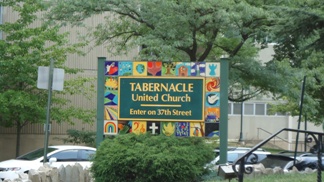Nov 01, 2025
Nov 01, 2025
Prologue
As evening approached, I walked out into the balcony of my son’s rented residence in suburban Philadelphia. It is located on the eleventh floor of an imposing apartment building and overlooks a densely wooded park. The sun was setting beyond the trees and there were three churches in the distance which raised their heads above the tall trees. The sky was wondrously crimson, though there was a hint of approaching darkness borne on the wings of serene peacefulness.

I settled comfortably on a light balcony chair preparing myself to be lost in thought. The churches were slowly disappearing in the night sky and I found myself wondering about the nature of the Holy Trinity of Christian Faith, the Father, the Son and the Holy Spirit. Should google this up I told myself, when it walked over and sat on the empty seat next to me. I don’t think I would have noticed its arrival at all had it not been for the silent creak the chair made under its weight. In fact it was the very silence of the creak that drew my attention towards its presence.
I looked sideways at the chair. It was quite unoccupied and that surely was a surprise. It was not my son therefore who was sitting there. Nor I, the father. And that left only one possibility open. If anyone was sitting there at all, it could be the Holy Spirit alone, or a spirit at least.
A vague chill ran down my spine as I looked behind at the lighted windows in the apartment. They were far too inviting given my circumstances and I tensed up in my chair ready to leave.
My chair creaked too. Audibly this time. Only spirits can produce silent creaks. You feel the creak, you don’t hear it. As I stirred, it sighed. Silently once again. Then it spoke, silence still unbroken.
“Things can change a lot I can see. It’s been seventy six years since I left this city,” said the noiseless voice. It was a reassuring, friendly voice. Warmth returned to my body.
“Oh really?” said I. “I left this country thirty nine years ago and never thought I should be passing this way again. But then, circumstances alter, plans are revised; life doesn’t follow a predetermined path. As you said, things can change a lot. So, here I am.” Conversation was easy, vocal chords having no role to play.
“This is far away from where I lived those days. It was in the downtown area.”
“Is that so? What was your address?” I asked, feeling bolder.
There was no response to this question for a long while and I began to wonder if it was still sitting there. “What was your address?” I repeated.
It sighed, making me feel curious. “Why do you sigh?” I asked.
“I have forgotten the address,” the voiceless voice said finally, almost pathetically. “Actually, this is what I wanted to discuss with you.”
“How do you mean?” I asked uncomprehending.
“I mean …,” it seemed to hesitate. “Can you help me find the address?”
I was dumbfounded now. I looked up at the sky. There was no trace of light there anymore. I searched in vain there for a reply. Then I turned my head towards the chair again. I felt a little annoyed now.
“You wish me to find an address where a whiff of thin air lived seventy six years ago?”
“Oh, no, no …,” it was quick to answer this time. “I had a visible shape then. Sooner or later all of us turn into airy nothing. It will happen to you too.”
“OK,” said I, still irritated. “But I should at least know what this physical form looked like. How else could I locate where it lived? Besides, I cannot proceed without a name. I can’t possibly walk the streets of downtown Philadelphia with neither your faded picture nor your name, asking people where you lived.”
“I just remembered my name,” it said, sounding stupidly gleeful.
“What was it?” I challenged.
“Same as your father’s,” the reply came sharp and quick.
I almost fell out of the chair, but I managed to find back my balance, physical as well as mental. “Are you my father’s ghost then?” said I.
“Yes, I am. Not the Holy Ghost though. Just an ordinary ghost. Why don’t you inquire at the School of Dentistry in the University of Pennsylvania. They could have my address in the records.”
I felt a strange excitement rising inside me. “Sure I will,” I told him. “I think an email should bring a quick reply. I might be able to find an answer for you by this time tomorrow evening. Shall we make that an appointment?”
“Email?” the Voice said doubtfully. “What’s that?”
“It’s an invisible mail service. Much like you. Don’t worry, it works. If you can exist without a shape, so can a letter.”
“But how can you read an invisible letter? I can at least talk. Letters don’t talk.”
“You think you can talk, but no one can hear you. Do you realize that?”
“You can hear me, can’t you?” he said somewhat petulantly. It was time I recognized it to be a “he”.
“That’s right, but only I can hear you. No one apart from me. Same way for the email. Only I will be able to read it, no one else. You need a password, like a secret code.”
“Very well,” he replied, appearing somewhat unconvinced. “I feel more comfortable with ink and paper. Something you can touch. A postman brings you back the reply. Everything is touchable.”
“Anyway, leave it to me,” I tried to placate him. “I will be here tomorrow, hopefully with an answer.”
~*~
A flurry of activity followed on the computer. An email to the Students’ Affairs Office brought a reply next morning. They were pretty cooperative I found out. Here is the email I received, along with the attachment shown next to it.
 “Dr. Dasgupta,
“Dr. Dasgupta,
Ms. Maren Gaughan forwarded your email request to my office. We have checked in our office to see if we have any records that would help to answer your query, but unfortunately we cannot find anything.
However, we did contact the dental school library and asked to review the 1935 yearbook. I am forwarding you some information we found that may be of interest. Unfortunately, we could not find your father’s exact address, but do notice that he may have lived in the International Student’s House near the Penn campus for a period of time. Today, the International House is located at 3701 Chestnut Street and is a tall modern structure. You may want to contact them to see if you can find out any more information about their location/occupants in the thirties. Their phone number is *** *** ****.
Although I know we are not able to give you the exact information you are seeking, I hope you find this information of interest.
Susan Schwartz (A University of Rochester alum like yourself)
_____________________
Susan Schwartz
Assistant Dean for Student Affairs
University of Pennsylvania School of Dental Medicine
240 S. 40th Street, Philadelphia, PA 19104-6030”
Ruminating
It was not too hard to locate 3701 Chestnut Street on Google Maps and then, with the aid of my son and daughter in law, to figure out a simple route to the destination. Overbrook Station stands right next to the building my son lives in and 30th. Street Station, which is in the middle of downtown Philadelphia, is only one station away by the Septa Train Service. Philadelphia is a town I am not familiar with, but I was quite sure that I wanted to make the trip accompanied by no one other than him and him alone. And I was informed that a cab could be the best choice from 30th. Street to the International House on Chestnut Street. Also, much to my satisfaction, the children did not wish to bother me with questions about what I should be doing after the train dropped me at the 30th. Street Station.
The plan was ready, but the day for the journey kept getting postponed. A safe distance from the balcony was called for during this period, since I knew that explanations were in order. And my sixth sense told me that he would never confront me inside the house. Plans needed to be made in the privacy of the balcony. When I was finally sure of the day and the hour, I had a meeting with him. It was the evening immediately preceding the day.
“You are taking far too long, aren’t you?” he seemed quite desperate.
“Yes,” I said. “Sorry about this. But why should it perturb you? Do you really want me to believe that you can’t make it there alone? If you found your way to this apartment, what prevents you from making it there by yourself?”
“I told you, didn’t I, that I have forgotten the address,” he almost whined.
“Oh come on,” exclaimed I. “Who gave you the address to this apartment? You went through the trouble of discovering a building that didn’t exist during your time and now you are making this preposterous claim that you can’t find one that did!”
“I followed you to this building …,” he said somewhat hesitatingly.
“You mean you boarded the plane with me at Delhi? You need a plane to fly to America?” I almost laughed.
“How on earth do I keep track of where you were headed if we travelled in different vehicles?” he sounded angry now.
“I have never come across such a powerless gh…,” I applied the brakes just in time. “Well, anyway, I am off tomorrow. There is a train around 1 PM. You’ll find me at the platform waiting for the train. Do you know your way to the station?”
“No,” he answered, not surprisingly anymore.
“OK, then just follow me,” I said, throwing my hands up in exasperation.
~*~
Next day, at the appointed hour, we boarded the train. I sat next to a young black boy and he sat on the boy’s lap. The boy didn’t seem to mind. I watched the passing scenery through the window, submerged in thought once again.
My mind kept wondering. Is this a game my subconscious is playing with me? Deep down inside me, am I hearing the voice of Albert Camus? Didn’t something almost similar happen to Camus in his autobiographical novel “The First Man”?
No, this is surely a joke. It’s sheer farce to compare my state with Camus’. Yet, a scene from the novel surfaced in my mind with a force I couldn’t ignore. Camus, it appears, never quite identified himself as a Frenchman, whatever the rest of the world might have supposed him to be. Indeed, he hardly believed that he had a country he could call his own. He grew up in Algeria, but he was no more than a refugee without roots there, a ‘first man’ at best. It was this realization that breathed life into his search for his father, who in turn was a ‘dead stranger’ to him.
Camus had not known his father, who was sent to the battlefield in 1914 and died of head injuries near Marne during the initial phase of the First World War at the age of 26. The son at the time was barely one year old. The authorities had buried the father in the military graveyard in Brittany, France, which, as in the case of his child, was not exactly his own country. Like his son, he too had been a ‘first man’ in Algeria.
Standing in front of his father’s tomb at the age of 40, Camus comprehended the enormity of his tragedy. His hunt for a root had led him to a man who was laid to rest at an age much younger than that of the son who had come to discover him. This “baby inside the grave’ as it were could not possibly rid the older man of the ‘first man’ stigma! They were both epiphytes hanging in empty space!
I ended up realizing that, even if it sounded ridiculous, there was an artificial similarity between the two fathers. My father was a refugee of sorts in India following the partition of the country into India and Pakistan. He was born and brought up in Dacca (now Dhaka, the capital of Bangladesh) before India found independence. However, Dacca went to East Pakistan after the partition of British India and my father spent his working life in Calcutta (now Kolkata), India.
To set the records straight, however, he had migrated to Calcutta before the partition, since Calcutta was a better city for a young surgeon to begin his career. I was born before independence, but my father was already practising in Calcutta when I made my appearance. I don’t think though that I was ever conscious of being a victim of the ‘first man’ syndrome, even if in reality I was afflicted by it. My father, on the other hand, couldn't stop speaking about his youth in Dacca, a city with which I have no link at all. I did visit the Dacca of yore, prior to the partition, when my parents took me there for an uncle’s wedding. But I retain nothing more than vague memories of that visit.
My father continued to live beyond his late twenties of course and passed away in his late eighties. But he had no idea what lay ahead of him the day he emerged with his DDS degree from the Thomas W. Evans Museum and Dental Institute at the intersection of Spruce Street and 40th Street in downtown Philadelphia. He was humming Que Sera Sera for all I know as he was packing up for his return journey to India. There is simply no way either of discovering the dreams he carried back home. But I am fully aware today of pretty much all the events that took place in his life since then, the tears in which he drowned, the smiles by which he was flooded, the indiscretions that led him astray, the wisdom that didn’t visit him. Like Camus, I was a wizened old man traveling in search of the baby father. The only difference was that while he had stood in front of a grave, I was on my way to locate a cradle!
~*~
I didn’t emerge from my trance till the cab driver pulled up in front of the International House. I stared for a while at the sign and then at the House.


He sounded disgusted. “I never lived here. What is this? A monster?”
“No,” I assured him, “this is the International House for the University of Pennsylvania. It houses foreign students.”
“No, this is not the International House. Your email has misguided you. I told you letters are more dependable. Honest postmen deliver them.” He was close to sobbing. And the sob turned into a howl when he looked down Chestnut Street. “They are cheating us. Who put up these ugly stuctures here?” he asked.
“But you had admitted the other evening didn’t you, that things can change?” I was quick to remind him.
He didn’t reply. His speech had taken leave of him it seemed. It was hard to communicate with someone who had no use of either sight or sound. I looked around hopelessly and finally whispered within myself, “Are you still around?” But there was no reply for several minutes.
And then, from across the street, I heard him scream in wild silence. “I know this building. I have walked past it times without number. Yes, yes, I lived close by.”
I stared at the structure that he was obviously drawing my attention to. It stood facing the International House. A study of contrasts it seemed!
I waited till the street lights changed and then crossed over. This is the sign that greeted me in front of the buillding.

A Historical Detour
“I lived somewhere nearby,” he was pleased beyond description. “Let’s walk around and find out.”
“Can’t you see that the sun’s literally burning holes in my skin now? It’s one of the hottest summers in North America. I am drenched in sweat and you wish me to run about in search of a non-existent house in which a non-existent Indian lived in the dense darkness of the past. I have pampered you enough. Give me a break, will you? ”
He wasn’t put off by this at all. “You have wasted my time,” he said instead, in a tone full of disgust.
“Oh come on!” I exclaimed, unable to control my temper this time. “I think I have had enough of this. I will just go and ask the International House people about old records. If they have them, they have them. Otherwise, I am going back home. And who are you anyway? I have no proof of your identity.”
“I used to buy good South Indian coffee from Kamla Vilas in Calcutta and bring it back home for you. See if you can identify me. You used to love that coffee, remember?”
There was a mellow softness in the voice now. He was providing a spiritual proof of existence it would seem. Yes, what he said did ring a bell.
“Kamla Vilas has fallen on hard times now. That good coffee is no longer available. But yes, I did love their coffee many years ago.”
I stood waiting for him to say something, but in vain. He had stopped speaking again. Upset probably, I thought. “OK, I will walk over to the International House and ask them,” said I and prepared to retrace my steps to the tall building.
“Your optimism borders on insanity,” I heard him say suddenly. “You’ll never find me there. Nothing like me can exist there.”
I felt he was not far from the truth. I didn’t have great expectations from the people in charge of this sky scraper. I thought for a while and then finally came out with an idea. “You know what? Let’s ask Google about the history of the International House. That could take us back to where you belong.”
“Google?” his voice staggered. “What a funny name? Who’s this? Where does he live?”
“I don’t know where he lives, but I know how to contact him.”
“He has a phone number, does he?” he asked curiously. And then muttered almost inaudibly, “Google … Can’t believe someone was named Google … Are you sure you are not confusing the name with Googly? But then Googly cannot be a human name, can it? Does he play cricket?”
I had stopped paying attention to him and was looking around for a coffee shop. Starbucks had free wi-fi service I knew. I could go into one and read up about the history of the International House on my tabloid. I spotted a coffee shop on Chestnut Street and walked into it. It was not Starbucks, but there was a chance that they had wi-fi there. I was lucky. The girl at the counter said I could access their wi-fi and I ordered a large coffee.
As I was waiting, he suddenly spoke up. “You didn’t order one for me. I used to bring fresh coffee for you from Kamla Vilas.”
I was completely taken aback. “Tell me, OK, just tell me how you will drink your stupid coffee? And how would the people in the restaurant react to a person ordering two coffees only to leave one untouched? They will stare at me, do you realize? Sitting alone with two paper cups brimming with coffee? Stop being absurd, will you?”
But he was adamant. “I used to buy coffee for you whenever you wanted.”
He wouldn’t give up. So it was I who finally did and ordered the extra coffee which no one would drink. There was a conc erned look in the girl’s eyes when I went up to the counter for the second order, but I decided to ignore it, came back to the empty table and turned on my tabloid. “Look, don’t disturb me,” I warned. “I shall be communicating with Google now and you must allow me to concentrate. And rest assured that, unlike you, Google doesn’t need to prove its existence.”
Click on this LINK for the Concluding Second Part
08-Oct-2011
More by : Dipankar Dasgupta

|
@ Wandering_but_no_lost_kind Please click on Continued at the end. It's a link that takes you to the concluding second part! Thanks for liking it friend. I am particularly happy that you saw why Camus was used. Best regards. |

|
A very well-written story. I loved the connection that the writer made between what Camus wrote and his own story--a perfect example that literature can sometimes provide us with means to comprehend a situation that we have not even experienced yet! I cannot wait for the next installment. Please keep me posted. |